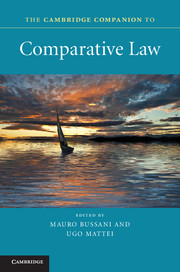Book contents
- Frontmatter
- Contents
- Contributors
- Abbreviations
- Preface
- Part I Knowing comparative law
- 1 Comparative law and neighbouring disciplines
- 2 Political ideology and comparative law
- 3 Economic analysis and comparative law
- 4 Comparative law and anthropology
- 5 Comparative law and language
- Part II Comparative law fields
- Part III Comparative law in the flux of civilizations
- Index
- References
1 - Comparative law and neighbouring disciplines
Published online by Cambridge University Press: 05 May 2013
- Frontmatter
- Contents
- Contributors
- Abbreviations
- Preface
- Part I Knowing comparative law
- 1 Comparative law and neighbouring disciplines
- 2 Political ideology and comparative law
- 3 Economic analysis and comparative law
- 4 Comparative law and anthropology
- 5 Comparative law and language
- Part II Comparative law fields
- Part III Comparative law in the flux of civilizations
- Index
- References
Summary
Looking at comparative law in the broader context of other disciplines helps us to understand the field mainly for two reasons: distinguishing it from other disciplines shows more clearly what comparative law is; and relating it to cognate subjects shows how it interacts with neighbouring fields, especially how it contributes to, benefits from, or overlaps with them.
As a result, contrasting comparative law and its neighbouring disciplines has long been a standard exercise performed in many introductions (treatises and casebooks) to the field; these exercises are usually brief and necessarily superficial (see ‘Further reading’, section 1). Today, there is also a plethora of essays which explore the relationship between comparative law and a particular neighbouring discipline in greater depth; these essays are often extensive and sophisticated (‘Further reading’, section 2).
There is a traditional list of disciplines to which comparative law has routinely been related: the study of foreign law, private and public international law, legal history, the sociology of law, and, sometimes, legal philosophy. Today, one should add at least transnational law, legal anthropology, and the economic analysis of law. To be sure, any such list is somewhat arbitrary, in particular because it could plausibly be extended, for example by including linguistic studies. Even further extension, however, would make the list unmanageable in the context of this survey.
- Type
- Chapter
- Information
- The Cambridge Companion to Comparative Law , pp. 13 - 34Publisher: Cambridge University PressPrint publication year: 2012
References
- 15
- Cited by

